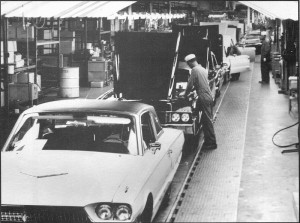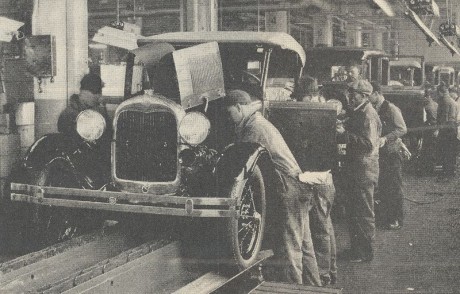 Once upon a time, the U.S. economy produced a seemingly unending supply of good paying jobs that enabled American workers to buy homes, raise families and live the American Dream. But now all of that has changed. Over the past several decades, there have been some fundamental shifts in our economy that have steadily eroded the value of the American worker. Thanks to incredible advances in robotics, computers and other fields of technology, many economic activities that once required a tremendous amount of manpower now require very little. Nothing is going to reverse those technological advances, so the jobs that have been lost as a result are now gone forever. But there are millions of other good jobs that we have lost that we could have done something about. Over the past couple of decades, millions upon millions of American jobs have been shipped overseas. Thanks to a whole host of “free trade” agreements that our politicians promised would be very good for our economy, U.S. workers have now been merged into a global labor pool with hundreds of millions of workers on the other side of the globe that live in countries where it is legal to pay slave labor wages. In such a situation, it is only natural for big corporations to shift production from high wage areas to low wage areas. Unemployment in America has skyrocketed and so have corporate profits. Today, corporate profits as a percentage of U.S. GDP are at an all-time high, but wages as a percentage of U.S. GDP are near an all-time low. The lack of decent jobs in the United States is one of the primary reasons why we are in an economic crisis that never seems to end, and things are not going to turn around any time soon. We truly are witnessing the slow, tortuous death of the American worker, and politicians from both political parties are just standing aside and letting it happen.
Once upon a time, the U.S. economy produced a seemingly unending supply of good paying jobs that enabled American workers to buy homes, raise families and live the American Dream. But now all of that has changed. Over the past several decades, there have been some fundamental shifts in our economy that have steadily eroded the value of the American worker. Thanks to incredible advances in robotics, computers and other fields of technology, many economic activities that once required a tremendous amount of manpower now require very little. Nothing is going to reverse those technological advances, so the jobs that have been lost as a result are now gone forever. But there are millions of other good jobs that we have lost that we could have done something about. Over the past couple of decades, millions upon millions of American jobs have been shipped overseas. Thanks to a whole host of “free trade” agreements that our politicians promised would be very good for our economy, U.S. workers have now been merged into a global labor pool with hundreds of millions of workers on the other side of the globe that live in countries where it is legal to pay slave labor wages. In such a situation, it is only natural for big corporations to shift production from high wage areas to low wage areas. Unemployment in America has skyrocketed and so have corporate profits. Today, corporate profits as a percentage of U.S. GDP are at an all-time high, but wages as a percentage of U.S. GDP are near an all-time low. The lack of decent jobs in the United States is one of the primary reasons why we are in an economic crisis that never seems to end, and things are not going to turn around any time soon. We truly are witnessing the slow, tortuous death of the American worker, and politicians from both political parties are just standing aside and letting it happen.
Back in the old days, just about everyone that was willing to work hard in America could easily go out and get a decent job. But today there is savage competition even for jobs that pay close to minimum wage. For example, thousands upon thousands of people recently applied for just 200 jobs at a new Target in Albuquerque, New Mexico…
Thousands of people applied for 200 new jobs at Target over the last three days in Northeast Albuquerque.
KOAT Action 7 News went to Target’s job fair at the Marriott Uptown every day and continued to find lines snaking around the building.
Candidates only have a one in 35 chance in getting a job, but many have said they’re confident they can stand out from the pack.
Those candidates have less than a 3 percent chance of getting one of those jobs at Target. The odds of getting into Harvard are actually far better than that.
But at least there is some economic activity going on in Albuquerque. All over the country there are other cities that were once bustling with economic activity that are now dying a depressingly slow death. For example, just check out the following excerpt from an article by Don Terry about Gary, Indiana entitled “Where Work Disappears and Dreams Die“…
Like Flint, Detroit, Cleveland, and Akron, like hundreds of cities and towns across the once-industrial Midwest, Gary is emblematic of the new American poverty, the poverty that descended when the factories closed down. The city is half the size it was in 1970, its population reduced from 170,000 then to 80,000 today. Its poverty rate is 28 percent. A fifth of its houses, churches, school buildings, and other structures are vacant and boarded-up. The hulking steel mills still line the Lake Michigan shore in northwest Indiana, but they’ve been hemorrhaging workers for decades.
You can see some stunning photos of the ruins of Gary, Indiana right here. It is hard to imagine that Gary was once a truly great manufacturing city.
But of course Gary is far from alone. The following is from a recent article posted on Economy In Crisis that detailed the shocking decline of Ypsilanti, Michigan…
In the late 1970s, some 20,000 people worked for Ford and General Motors in Ypsilanti. Today, only a few hundred work in the auto industry here. It’s the same story in cities throughout Michigan, Ohio, and Indiana.
To say the least, Ypsilanti has seen better days. Tax revenues have plummeted over the past 20 years. The mayor says he’s considering combining fire and police into one department. The parks and recreation department has a budget of $0. It’s just a web page that rarely gets updated.
Meanwhile, U.S. car companies are busy putting up shiny new factories on the other side of the globe. For instance, Chrysler recently announced plans to build new manufacturing facilities in China and Russia.
You don’t hear much about the decline of manufacturing in the United States on the mainstream news, but it is certainly one of the biggest economic stories of this century so far. Back in the year 2000, there were more than 17 million Americans working in manufacturing, but now there are less than 12 million.
So what are American workers supposed to do?
Are they supposed to learn new skills for the “jobs of tomorrow”?
One of the few areas of the U.S. economy that has been steadily growing has been the healthcare industry. There are hordes of Baby Boomers that are getting older, and they are going to need a whole lot of medical care. I used to tell friends that nursing is a good field to go into because there will always be jobs available. In fact, at one point we were told that there was supposedly a “shortage” of nurses in America.
Well, CNN recently ran a piece about recent nursing graduates that cannot seem to find work no matter how hard they try. The following is a short excerpt from one of those horror stories…
I graduated from San Jose State University in May and got my registered nurse license in July. I have been searching and applying for an RN position for seven months now and still have not found a nursing job.
I have applied for jobs all over California and also other states such as Texas, Nevada, Oklahoma, and Virginia.
So if you can’t find a job in healthcare, what field are you supposed to go into?
Please don’t say law. There are hordes of new law school graduates competing for very few entry-level jobs each year. In fact, one law firm has come up with the bright idea of making young lawyers pay a fee for the “privilege” of getting legal experience by working there. Just check out their Craigslist ad.
The cold, hard truth is that there are not nearly enough jobs in America today. As a result, our incomes are declining. Median household income in the United States has fallen for four years in a row. Overall, it has fallen by more than $4000 during that time period.
Things have been particularly rough on younger Americans. If you can believe it, U.S. families that have a head of household that is under the age of 30 have a poverty rate of 37 percent.
And, as a recent RT article explained, life expectancy for younger Americans is depressingly low…
Also, new evidence revealed that younger generation of US citizens (those under 50) die earlier and have poorer health than their counterparts in other developed nations, according to a new study of health and longevity in US.
US men ranked last in life expectancy among the 17 countries in the study, and American women as second to last.
The 378-page report by a panel of experts convened by the Institute of Medicine and the National Research Council was based on a broad review of mortality and health studies and statistics and included other countries such as, Canada, Japan, Australia, France, Germany and Spain.
The future simply does not look too bright for American workers. Thanks to advances in technology and the rampant offshoring of jobs, big corporations simply do not need U.S. workers as much as they used to. In fact, many of them try to minimize the number of expensive American workers that they have on the payroll as much as they can.
So what are we all supposed to do?
What are we supposed to tell the millions of American workers that cannot find jobs?
Well, I guess the good news is that you can find “We Accept EBT” signs just about everywhere these days. As the number of good jobs has declined, the number of Americans on food stamps has absolutely soared.
If you can believe it, the number of Americans on food stamps rose from about 17 million in the year 2000 to more than 47 million today.
That is staggering, and it is truly unprecedented.
Back in the 1970s, about one out of every 50 Americans was on food stamps.
Today, about one out of every 6.5 Americans is on food stamps.
The American worker is dying a slow, tortuous death, and unless dramatic action is taken immediately, things are going to get a whole lot worse.
For much more on all of this, please see another article that I wrote recently entitled “The Middle Class In America Is Being Wiped Out – Here Are 60 Facts That Prove It“.
So what do you think the future looks like for the average American worker? Please feel free to post a comment with your thoughts below…
